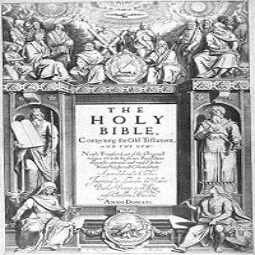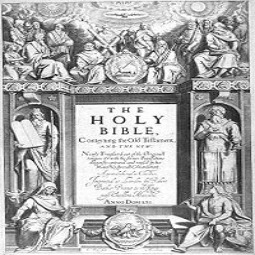MTMattie
Well-known member
The following was copied, by permission, from
He is not yet a member here, but I found some of the information compelling and wanted to share no matter which side of the coin you favor.
REFORMATION RUMBLINGS BY
BUFF SCOTT, JR.
BUFF SCOTT, JR.
He is not yet a member here, but I found some of the information compelling and wanted to share no matter which side of the coin you favor.
Being Clear From The BeginningI think it might be expedient to say that if King James had not intervened in the efforts of his Hebrew and Greek scholars, the KJV of the Scriptures might have turned out to be among the most accurate translations. His interference and dictatorial decrees must have annoyed his scholars and surely impeded their endeavor to translate the Hebrew and Greek manuscripts flawlessly—or at least as closely as possible to the oldest available manuscripts.
Consequently, most of the blame for the distorted sections of the KJV should be ascribed to King James, not to his translators. The King’s preferences relating to “church,” “Easter,” “baptize,” “Bishop,” plus other Biblical terms, had to be adhered to by his translators. Indeed he became the foremost innovator of “Mad Church Disease,” “Mad Easter Disease,” “Mad Bishop Disease,” and other theological disfigurements. The “side-effects” from the King’s blunders can be seen in the myriads of divisions, discords, and schisms among us.
He told his translators, “When any word hath divers significations, that to be kept which has been most commonly used by the most eminent fathers, being agreeable to the propriety of the place, and the analogy of the faith.”
To paraphrase the King, “When any word has different meanings, you are to keep only the most commonly used by the most eminent church fathers who founded our faith, regardless of the Greek’s implication.”— www.bible-researcher.com/kjvhist.html
The King’s Decrees To His TranslatorsPlease give your attention to the History. King James instructed his translators, “The old ecclesiastical words to be kept...” He insisted that all ecclesiastical terms be retained. In Hebrews 2:12 of the KJV, the writer quotes from Psalms 22:22, “For which cause he is not ashamed to call them brethren, saying, ‘I will declare thy name unto my brethren; in the midst of the church will I sing praise unto you.’ ”
The Psalmist passage in the KJV reads, “I will declare thy name unto my brethren; in the midst of the congregation will I praise thee.” The Hebrew word for “congregation” is kaw-hawl, which means assembly, company, congregation, community. The Greek counterpart for congregation or assembly is ekklesia. The King’s method of manipulating is almost unbelievable, for in Psalms 22:22 “congregation” is accurate, but in Hebrews 2:12 “church” is inaccurate, faulty translated, spurious, and a total distortion of the Greek.
Travel With Me To Acts, Chapter 19
It can easily be demonstrated that King James was inconsistent and manipulative. In verses 32, 39, and 41, ekklesia correctly delivers “assembly.” My concern is why did his translators fail to translate ekklesia “church” in these passages, as they did elsewhere? If they and the King had been logically compatible, we would have, “For the church was confused,” “It shall be determined in a lawful church,” and “He dismissed the church.”
The reason for this discrepancy is evident. The king forced “church” into his translation to bolster his sect, The Established Church of England. The point I wish to make is if ekklesia is delivered correctly here, it is delivered incorrectly wherever “church” is found. There is no escaping this fact. The King went wild in using “church.” In verse 37, he even used it in place of “temple!”
One of the foundational features of The Established Church of England sect was that she was colonized around “church,” just as our religious parties are. Hence, to keep “church” out of his version of the scriptures would have made him appear as though he were King and Head of a commonplace congregation or assembly. That would have been degrading!
“Church” And Other Translations“Church” became so common following the KJV that most all other translations followed suit. There are a few exceptions, however. The Authentic New Testament [1955], translated by Hugh J. Schonfield, a Jew, gives “congregation” as the translation of ekklesia. Alexander Campbell’s Living Oracles [1800s] does not carry “church.” He used “church” in some of his writings, but he left it out of his Living Oracles. He knew the Greek ekklesia did not justify it. Another translation destitute of “church” is The Christian Bible [1991].
The deliberate mistake made by King James has cost us dearly, for contemporary religions have pounced upon his offense by creating and establishing sects and factions under the guise of “church” until they have divided and sub-divided themselves out of practical existence. The result? An apostate system.
Another one of the King’s unsightly terms is “Bishop,” as used in 1 Timothy 3:1 and Titus 1:7. The Established Church of England had autocratic leaders called “Bishops.” The Greek in the Timothy passage is ep-is-kop-ay' and means “inspection” or “superintendence”—in short, an overseer or superintendent.
The Greek in Titus is ep-is'-kop-os, signifying leadership abilities, overseer, or one in charge. Age-wise, these men were elders and gifted with wisdom, hospitably, and self-controlled. Young inexperienced men were never referred to as “elders,” for they are usually hot-headed and lack control and wisdom. “Bishop” portrays authority, control, and supremacy, the exact personality of The Established Church of England. Our Lord did not found this sort of ekklesia.
Let’s briefly address one more of the King’s botches before we close—namely, “Easter,” as found in Acts 12:7. The Greek is pascha, meaning Passover. I have before me Adam Clarke’s treatise on The Acts of the Apostles. Clarke was a renowned Hebrew and Greek theologian (1762-1832). Here are his comments on King James’ deliberate indiscretion. They are mentally stimulating!
One More Botch
“The goddess Easter, whose festival was celebrated by our pagan forefathers on the month of April...Perhaps there never was a more unhappy, not to say absurd, translation than that in our text...Every view we can take of this subject shows the gross impropriety of retaining a name every way exceptionable and palpably absurd” (pages 774-775).
And there we have it. Other translations correct many of King James’ missteps and mistakes, but not all errors have been rectified—particularly “church.” I suspect we are stuck with it until time is no more. But I will never again use it as a unifying appellation, glorify it, or praise it. I am forever finished with “Mad Church Disease,” except to reveal its partisan, divisive colors.


